More Than a Game
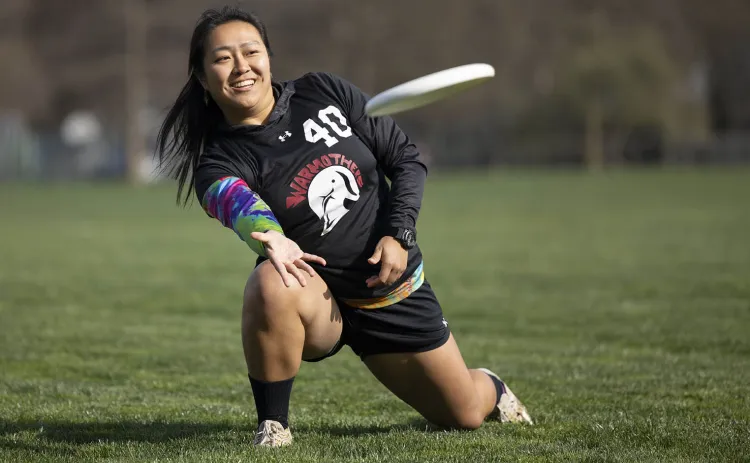
“I wanted to try something new that would keep me strong,” says Annabel Zhao ’24 on joining Swarthmore Warmothers early in her college tenure. She eventually rose to captain, drawing on her own journey to support others.
Taking part in varsity, club, and/or intramural sports can be a huge aspect of the Swarthmore student experience. These activities offer more than just exercise: They build community, foster discipline, and promote mental well-being. Athletes learn teamwork, resilience, and time management as they balance academics with sports commitments. They form lifelong friendships, develop leadership skills, and gain confidence. Here, two students and two graduates from the Class of 2024 reflect on how sports added meaning and verve to their Swarthmore experience.
A Source of Solace and Connection: Charisma Hasan ’24
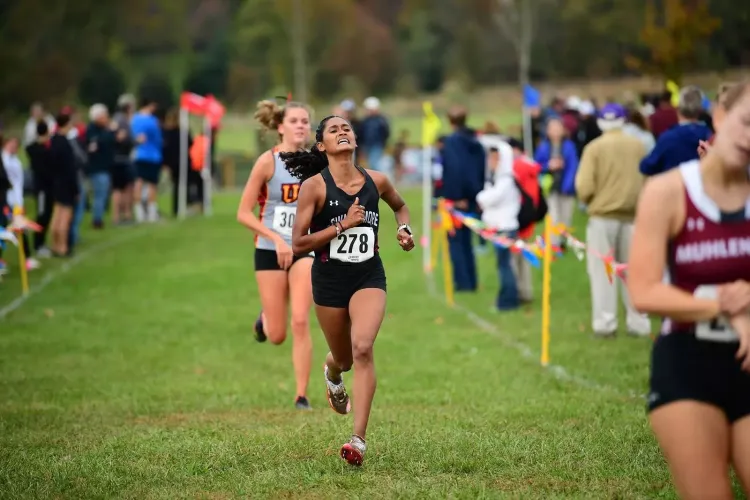
Charisma Hasan ’24 views her journey from casual runner to varsity college athlete as a gift — and it’s one she has paid forward.
In high school, she ran track to help stay in shape for soccer. A means to an end. But then the pandemic hit, and her world shifted. Running became a source of both solace and connection.
“It was one of the only ways to be around friends and loved ones,” says Hasan, who basked in the camaraderie of these meetups.
Striving to carry that momentum to Swarthmore, Hasan walked on to the cross-country team. But with that came hurdles. She faced imposter syndrome, wondering whether she belonged on the team, and if she could juggle the rigors of athletics and academics.
Once she got to campus and met students who had competed the previous year, though, her worries faded. Teammates took her seriously as a person and an athlete, and Hasan steadily grew into a real contributor.
As importantly, she made close friends. Students whom she came to view as family.
“For me, athletics has not only been for the sake of competing, but also developing a network of trust and support and love in all other aspects of my life,” she says. “I honestly couldn’t imagine how different my experience here would've been without athletics.”
Hasan’s “I made it” moment came sophomore year, when she represented the cross-country team in the regional NCAA championships, helping the Garnet to nearly qualify for nationals.
“That was the day that I felt like I was a part of something bigger than myself,” she says. “I felt like I was running for my teammates, and I knew how hard we all had worked for that moment.”
Hasan’s commitment to the College and well-being deepened the following year, when she built a personal training program from the ground up. She offered free sessions to students, faculty, and staff, ranging from club sport athletes to older adults looking to add exercise back into their lives.
“I was able to work with a breadth of clients with various goals, all the while honing my skills,” says Hasan, a certified trainer who is embarking on a career in sports medicine orthopedics. “It was honestly a gift.”
And it keeps on giving. Although Hasan graduated in May, the program now has six trainers.
“That’s kind of my child,” she says, “and it’s been incredibly rewarding to watch it grow.”
“Unparalleled and Unforgettable”: Daniel Peña ’27
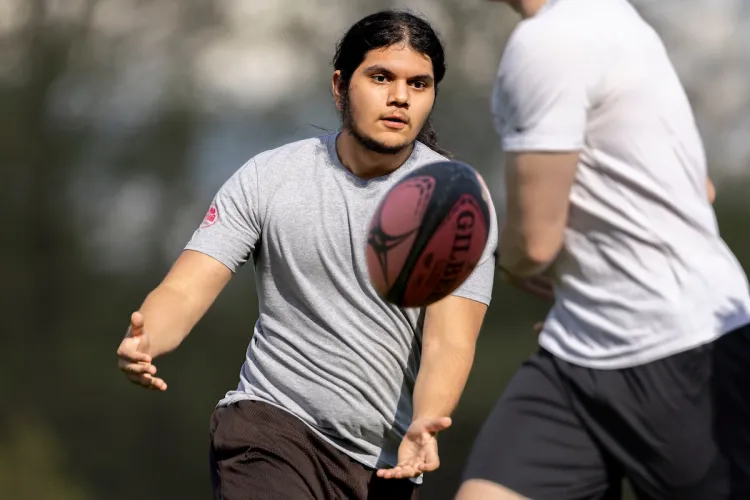
Growing up in Houston, Texas, Daniel Peña ’27 never saw himself as an athlete. As an obese child and teenager, his connection to sports was limited to watching Happy Gilmore and The Waterboy, he says.
But all of that changed during his first days at Swarthmore. Here for the Summer Scholars Program (S3P), Peña felt a kinship with an upperclassman who belonged to the men’s club rugby team. Then he heard more about the “hooligan’s game played by gentlemen,” as the saying goes, at the activities fair.
“Why not, right?” he recalls thinking, before putting his name down. “Plus, it’s a PE credit.”
That might sound like an impulsive decision for such a rock-fight of a sport. But it’s proven hugely beneficial for Peña, imbuing his college experience with adventure and boosting his self-confidence.
“My experience with the team has been unparalleled and unforgettable,” he says.
Peña, who previously had struggled to ask for help, faced a steep learning curve, on top of the physical demands of the sport. Each practice brought new bruises, cuts, and the ever-present strain of pushing beyond limits. But rather than the game breaking him down, it built Peña up. His teammates were more than just competitors — they were guides, mentors, and friends.
Peña recalls moments from practice when older members of the team taught him how to tackle properly, not through harsh critique, but by demonstrating. By fostering an atmosphere of trust and mutual respect, they eased Peña’s fear of failure and helped him to step out of his comfort zone.
With coaches who emphasized teamwork over individual stardom, Peña realized that something as simple as asking where to stand during a play was a critical part of contributing to the team. This lesson rippled into his academic life, where he now knows that seeking guidance — from office hours to study groups — is a strength, not a weakness.
“The lessons I’ve learned apply to Swarthmore as a whole,” says Peña, who also serves as a personal trainer for Athletics.
One of Peña’s fondest memories is the "rainbow run," an ironically named team exercise that tested both physical endurance and mental grit. It was brutal — he wasn’t sure that he would finish. But running as a team, arms linked and voices cheering each other on, made him realize he wasn’t just a rugby player.
“At that moment I realized that I am part of this team,” he says, “but more importantly a part of the Swarthmore community.”
A Shift in Self-Perception: Annabel Zhao ’24
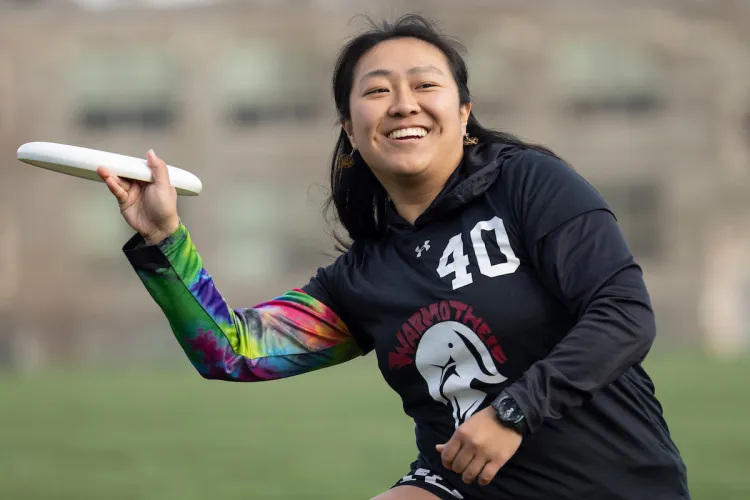
When Annabel Zhao ’24 arrived at Swarthmore, she carried the full weight of imposter syndrome and a particular aversion to athletics spaces.
Though she dabbled in soccer and swimming in high school, she felt more at home with activities like student government and Model U.N. But a strong Frisbee program in which many of Zhao’s friends competed had piqued her curiosity.
So when she reconnected with two high school alumni on campus, one of whom captained the Radnor Girls Ultimate Frisbee team, Zhao decided to give it a whirl.
“I wanted to try something new that would keep me strong,” she says. This simple aim would grow into something transformative.
Because her introduction to the Swarthmore Warmothers team came during the pandemic, it meant that practice sessions were virtual. The absence of in-person training left her unsure of her place in the sport. By the time the team returned to the field in Zhao’s sophomore year, she struggled to adapt physically.
Zhao spent much of the early games on the sidelines, she says, “wondering if I belonged.”
Determined to give Ultimate a real chance, though, Zhao committed to attending every practice and tournament, regardless of homework or fatigue. And she took to heart the encouragement and support from teammates.
Her confidence grew, along with her physical abilities. As Zhao focused on improving her skills, particularly throwing, her self-perception shifted.
“I began to see myself as a true athlete,” says Zhao, who also mustered the courage to take up running and and recently finished an 8K with Ultimate Frisbee teammates.
A pivotal moment came during the summer after her sophomore year, when Zhao played club Frisbee in Philadelphia. This experience boosted her confidence, preparing her to compete in Munich during a semester abroad. Playing internationally solidified her transformation from a novice to a player capable of adapting and learning in any setting.
As one of the captains of Swarthmore’s Women’s Ultimate team last year, Zhao drew on her own journey to support others. She fostered an inclusive environment where new players feel welcome, designing practices to help every player grow.
Her leadership was driven by the belief that Ultimate is not only about competing — it’s also about building community.
“I wanted to help others get that same feeling of family and empowerment that I did,” says Zhao. “That sense of confidence in one’s self that might not have come from any place else.”
An Emphasis on Inclusivity: Casey Ewing ’26
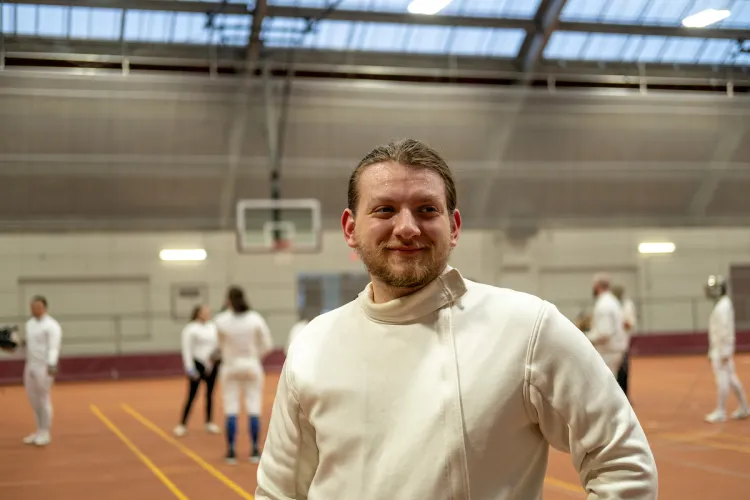
It is both surprising and natural that Casey Ewing ’26 found his way to fencing.
At South Hamilton High School in Jewell, Iowa, there were two groups of kids: the sports kids and the arts and academics kids. Ewing fell squarely in the latter group. But when he came to Swarthmore, he sought a sport in which he could try something new and boost his well-being.
When Ewing found the fencing club on the College’s website, it looked “interesting and cool.” The thinking person’s battle.
What began as an experiment for balance in his student life grew into a deeper commitment. Fencing, with its rare blend of mental agility and physical demands, hooked him instantly — becoming a cornerstone to his Swarthmore experience.
Most members, like Casey, were newcomers. And the club’s emphasis on inclusivity helped to make it feel less intimidating.
“We began with footwork, which everyone can approach,” says Ewing, an Honors philosophy and comparative literature major. “Then we slowly worked the weapons in, and it’s not until a few weeks in that we start bouting.”
Everyone fences differently, he learned, and brings their own style to the bout.
“It’s very interesting for me to approach a certain opponent and adapt my own style, see what works, learn what doesn't,” he says. “Every bout is a learning experience in its own way.”
But it wasn’t just the sport itself that captured his heart — it was the people. He reveled in the close-knit nature of his team, as well as opportunities to engage with fencing competitors from around the country.
“Fencing has this great social atmosphere,” says Ewing, who served as vice president of the team last year. “This openness of the sport and the people it attracts just creates a bond that keeps you coming back.”
Thinking back to his high school days, Ewing fondly recalls the rewards of creating music with classmates — “the collective effort to produce something.” Initially, he wondered if fencing was too different from that, too individualized. But it didn’t take long to see how deeply collaborative the sport is.
“I think what I’ll remember most is everyone crowded around the strip for a particular bout, just being there together and cheering each other on,” he says. “And how good it is to feel included and part of a team.”



